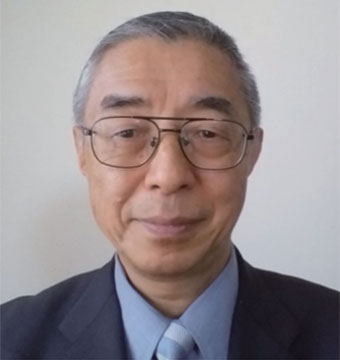Honorary Member

Dr. Takehiro Moriya received his M.S. in applied mathematics and instrumentation physics from the University of Tokyo in 1980. In the same year, he joined Nippon Telegraph and Telephone Public Corporation (currently Nippon Telegraph and Telephone Corporation (NTT)). In 1989, he was based at AT&T Bell Laboratories as a guest researcher. He was a visiting professor of a cooperation program at the Graduate School of the University of Tokyo from 2002 to 2005 and from 2011 to 2014. Since 2007, he has been Head of Moriya Research Laboratory, and an NTT fellow. He received his Ph.D. from the University of Tokyo in 1989.
For over 40 years, Dr. Moriya has been engaged in the research and development of high-efficiency coding of speech and audio signals and produced a large number of trailblazing research results. The technologies developed by the research team he led were, through proposals for international standardization and promotional efforts, applied to second-, third-, and fourth-generation mobile phone systems, low-bitrate music streaming, and losslessmusic streaming. They have thus greatly contributed to the realization, quality enhancement, and economization of a variety of communications services.
Aiming at application to digital mobile communication systems in the 1980s, his team created a large number of original key technologies, such as conjugate vector quantization and pitch synchronous noise excitation, and proposed PSI-CELP PDC for the half-rate standard in 1993. This scheme was adopted as the only scheme that could halve the amount of information compared to conventional schemes, thereby contributing to the widespread use of mobile phones. The addition of his team’s new ideas to these key technologies led to the adoption of ITU-T Rec. G.729 CS-ACELP in 1996. The technology adopted in this recommendation is one of the speech coding schemes essential to IP phone communication, and is used worldwide.
Building on technologies he had developed for speech coding, his team created a low-bitrate audio coding scheme, called TwinVQ, in 1995. TwinVQ was adopted in the early provision of music streaming by Microsoft in 1998, thereby leading the way for network-connected mobile music players. It was adopted in an ISO/IEC MPEG international standard in 1999.
He proposed standardization of lossless coding in 2000, and completed the standards for MPEG-4 ALS (audio lossless) in 2005. These standards were specified by the Ministry of Internal Affairs and Communications as ARIB standards for use in high-quality speech coding for Japan’s 4K/8K super-high-definition TV broadcasting. They are also used for high-resolution audio and high-definition video content delivery services. They also contributed to the development of lossless coding for telephony (ITU-TG.711.0), low-latency coding that substitutes for ISDN telephony, and high-compression, low-latency coding for use in wireless microphones.
In addition, his research team has made significant contribution to the establishment of the 3GPP EVS standards through international cooperative development in 2014. The EVS standards have been used worldwide as fourth-generation coding, enabling high-quality speech communication.
Dr. Moriya authored or co-authored “Forest of Knowledge,” “A Century History of the IEICE,” and “IEICE Milestones,” all published by the IEICE. He served as a member of the Editorial Committee of the IEICE Transactions. In recognition of his achievements, he received the Young Researcher’s Award, the Best Paper Award, the Achievement Award, the Kobayashi Memorial Achievement Award, the Distinguished Achievement and Contributions Award, and the Engineering Sciences Society Fundamentals Review Best Author Award from the IEICE. He has also received numerous other awards, including the Medal with Purple Ribbon, and the IEEE James L. Flanagan Speech and Audio Processing Award. He was designated as an IEICE fellow, an IEEE life fellow, and an honorary member by the Acoustical Society of Japan.
As is evident from the above, Dr. Moriya has made a distinguished contribution to the electronics, information and communication field, and we strongly recommend that Dr. Moriya be designated as a fellow, honorary member of the IEICE.